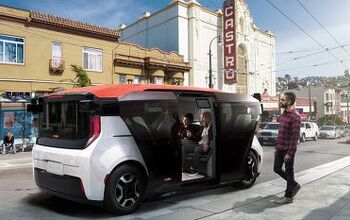Women Allowed to Drive in Saudi Arabia by Next Summer

Saudi Arabia doesn’t have what one might call a “progressive mindset” toward women. The ultra-conservative country is, however, attempting to improve its global image by finally giving them the right to drive. Announced in a royal decree over state television and in a simultaneous media event in Washington, Saudi Arabia says it will let drivers of the female persuasion use roadways in June of 2018.
Rights groups and Saudi activists have long campaigned for the overturn of the country’s driving ban; some women have even been arrested and jailed for defying the prohibition and taking the wheel. In 2014, one woman was detained for 73 days after two women crossed the border from the United Arab Emirates.
However, the fact that women can soon drive in Saudi Arabia doesn’t mean they will. Concerns remain that religious leaders and husbands will still attempt to forbid women from getting behind the wheel of an automobile.
It’s sort of like how the minister for the town in Footlose wouldn’t let kids dance or listen to rock music because he thought it would bolster immoral behaviors and bring about the end of civilization. Then Kevin Bacon shows up to throw a party and the town suddenly stops being awful. For our purposes, replace the small, fictional town of Bomont with all of Saudi Arabia, teenagers with women, rock-and-roll with everything, and Kevin Bacon with cars.
Still, the push to let women drive has considerable governmental and religious backing. Initial reports from The New York Times claim there is little public outcry against the proposal.
As a personal project of Crown Prince Mohammed bin Salman, the retraction of the ban was signed by King Salman. The degree says a “majority of senior [religious] scholars” deem the change legitimate under Islamic law and dictates that government ministries make the necessary legal adjustments by June 24th.
That’s still 10 months away, but the country says it needs sufficient time educate women on how to drive and men on how to interact with women on the road. While latter concerns are slightly bewildering, since women would hopefully have the same rules behind the wheel, the issue is a longstanding reason as to why women weren’t allowed to drive in the first place. Many have expressed concerns that female drivers would lead to widespread adulterous behavior and disintegration of traditional values.
Whether or not that actually happens, Saudi women still need reliable transportation. They’ve gradually entered the workforce in recent years and require more ways to get around. In fact, the country is seeing an influx of foreign-born drivers offering ride hailing services. Even Uber has gotten in on the action.
According to The Verge, the company raised $3.5 billion from the country’s main investment fund in 2016. As part of that deal, Saudi Arabia’s Public Investment Fund managing director Yasir Al Rumayyan took a place on Uber’s board — as did Princess Reema Bint Bandar Al Saud.
Uber executives have expressed support for allowing women to drive, but won’t say whether they plan to hire women drivers. “We’ve always said that women should be allowed to drive,” an Uber spokesperson said on Tuesday. “In the absence of that, we’re proud to have been able to provide extraordinary mobility that didn’t exist before. We look forward to continuing to support Saudi Arabia’s economic and social reforms.”
What an incredibly measured statement.
Still, whether every person in the country is ready to support the law or not, it’s past time Saudi Arabia did something to improve its image on the global stage. The nation’s restrictive domestic policies have received years of negative attention and allowing women to drive is a step in the right direction.
There’s also logistical reasons for the change. In addition to making women more mobile, additional cars on the road could help the country’s finances. With oil prices stuck near the bottom of the barrel, the Saudi economy could use some light prodding. But the government is framing the decision as something entirely social.
“There is no wrong time to do the right thing,” ambassador Prince Khaled bin Salman told the U.S. press this week. With women entering the workforce, “they need to drive themselves to work.” He then explained the 10-month delay was necessary to ensure the legal and logistical environment is prepared for the change. “We have to make sure our streets are ready,” he said.
A ministerial body will be set up to give advice on how to best implement the new law within 30 days.
[Image: Lujain al-Hathloul/ Youtube]

A staunch consumer advocate tracking industry trends and regulation. Before joining TTAC, Matt spent a decade working for marketing and research firms based in NYC. Clients included several of the world’s largest automakers, global tire brands, and aftermarket part suppliers. Dissatisfied with the corporate world and resentful of having to wear suits everyday, he pivoted to writing about cars. Since then, that man has become an ardent supporter of the right-to-repair movement, been interviewed on the auto industry by national radio broadcasts, driven more rental cars than anyone ever should, participated in amateur rallying events, and received the requisite minimum training as sanctioned by the SCCA. Handy with a wrench, Matt grew up surrounded by Detroit auto workers and managed to get a pizza delivery job before he was legally eligible. He later found himself driving box trucks through Manhattan, guaranteeing future sympathy for actual truckers. He continues to conduct research pertaining to the automotive sector as an independent contractor and has since moved back to his native Michigan, closer to where the cars are born. A contrarian, Matt claims to prefer understeer — stating that front and all-wheel drive vehicles cater best to his driving style.
More by Matt Posky
Latest Car Reviews
Read moreLatest Product Reviews
Read moreRecent Comments
- Ajla Is there something proprietary or installed on the moon with these that I'm not aware of?
- Tane94 Awaiting the EV3 unveil this month. Kia continues to lead, though I will miss the Soul
- Jeanbaptiste I know this will never be seen, but the real answer is NO Government mandated tech. The reason why is that when the government mandates something, we miss out on signals that the free market will give to weather or not people actually want this or that this tech would actually help. It's like mandating AM radio for cars when people could just buy a $10 am radio if they really like am so much.
- 28-Cars-Later $12K? I needed a good laugh.
- EBFlex Wait...the feds are claiming that inflation was not FJBs fault 6 months prior to an election where he is massively losing in the polls in every single category?Eyebrow raised.

































Comments
Join the conversation
To any Saudi chicks reading: if someone passes you on the right, you are hogging a lane, move over! Thank you, that's all I had to say.
Battle of the Asian Women, Saudi Women, and Blue Hairs as to who can now cause more collateral damage in vehicular mayhem.